Blu-ray: The World of Wong Kar Wai | reviews, news & interviews
Blu-ray: The World of Wong Kar Wai
Blu-ray: The World of Wong Kar Wai
A set of seven magical films from Hong Kong's master auteur
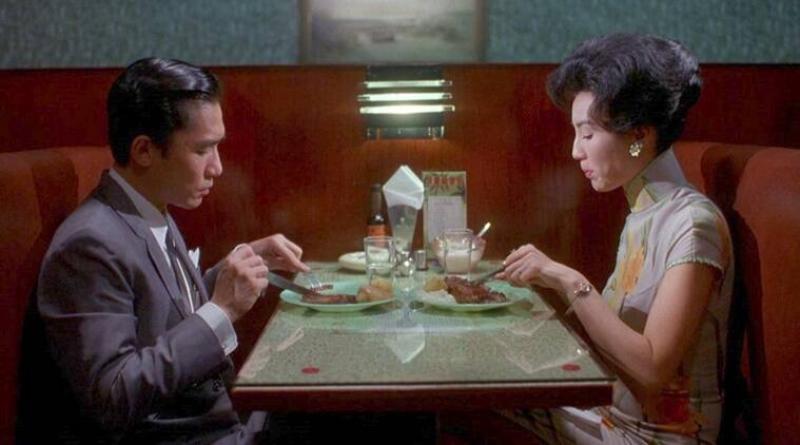
There is an irony in the fact that the most celebrated of auteurs to emerge during Hong Kong’s "Second Wave" of directors in the 1980s did not originate from within the bounds of the administrative region. Born in Shanghai, Wong Kar Wai was the son of a sailor and a housewife.
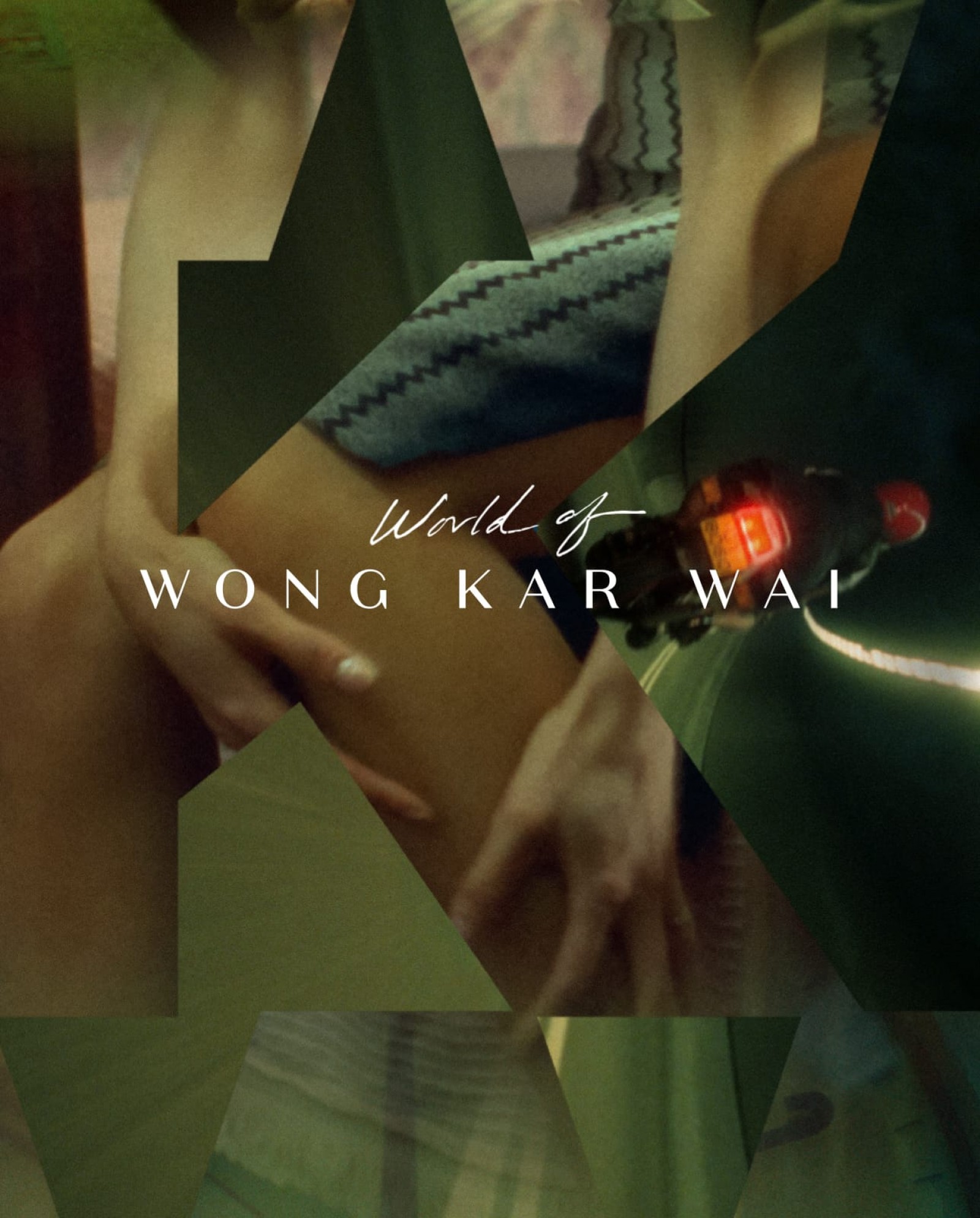 For Wong, the journey was a success. Less so, however, for his two older siblings, whom Wong would not see for a decade. It would be naïve to try to grasp the emotional toil of such a journey – but one gets a sense, at least, in Criterion's seven-disc release The World of Wong Kar Wai, of the extent to which that early period in Wong’s life helped form his thinking.
For Wong, the journey was a success. Less so, however, for his two older siblings, whom Wong would not see for a decade. It would be naïve to try to grasp the emotional toil of such a journey – but one gets a sense, at least, in Criterion's seven-disc release The World of Wong Kar Wai, of the extent to which that early period in Wong’s life helped form his thinking.
Digitally restored in 4K, the selected films span a broad range of Wong’s career, from his early features As Tears Go By (1988) and Days of Being Wild (1990), through his breakout films Chungking Express (1994), Fallen Angels (1995) and Happy Together (1997), to his most-widely recognised piece, In the Mood For Love (2000), and its futuristic sequel, 2046 (2004).
Wong’s first feature-length picture, As Tears Go By follows Wah (Andy Lau), a "big brother" within the mob. In a film laced with instinct, Wah’s task is to juggle the competing demands of mafia life against the pursuit of an unexpected romance with his cousin, Ngor (Maggie Chung).
As Tears Go By is not, strictly speaking, composed of two halves – Wong would turn to the diptych for both Chungking Express and Fallen Angels – but there are signs of a move in that direction in the way the film's alternate worlds compete for supremacy, clamorous Kowloon providing the criminal antithesis to Ngor’s tranquil home on Lantau Island.
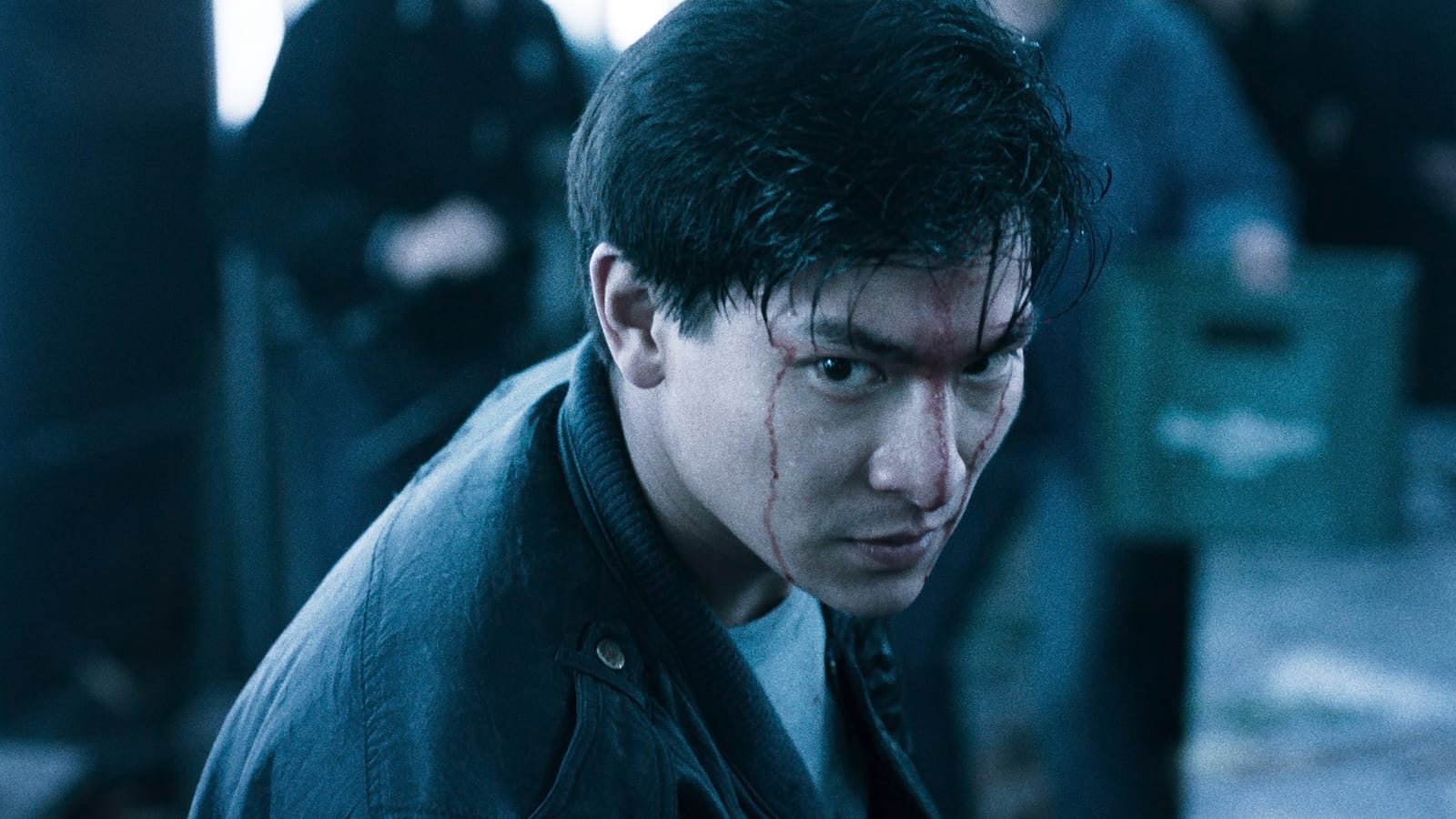 For most of the 1970s, martial arts films had dominated Hong Kong cinema. The emergence of crime thrillers in the ensuing "New Wave" represented a modernisation of that trend, and the signs of that influence in As Tears Go By confirm its place as Wong’s most conservative film. The world of the mob is one of image over substance; near-killed, Wah’s "little brother", Fly (Jacky Cheung), refuses to exit the game until he’s “made it big", being otherwise too ashamed to return to his mother. For all its turmoil, As Tears Go By finds the peak of its intensity not in brutal violence, but sensuous romance – a balance of power that would only increase as Wong continued to push the boundaries of filmmaking.
For most of the 1970s, martial arts films had dominated Hong Kong cinema. The emergence of crime thrillers in the ensuing "New Wave" represented a modernisation of that trend, and the signs of that influence in As Tears Go By confirm its place as Wong’s most conservative film. The world of the mob is one of image over substance; near-killed, Wah’s "little brother", Fly (Jacky Cheung), refuses to exit the game until he’s “made it big", being otherwise too ashamed to return to his mother. For all its turmoil, As Tears Go By finds the peak of its intensity not in brutal violence, but sensuous romance – a balance of power that would only increase as Wong continued to push the boundaries of filmmaking.
These themes recur much later in the collection. In the Mood For Love (2000), Wong’s most celebrated film, was the sixth of his seven collaborations, beginning with Days of Being Wild, with cinematograoher Christopher Doyle. It depicts the lives of two neighbours, Chow (Tony Leung) and Su (Maggie Cheung), their lives converging after a surprise discovery about their spouses. As in As Tears Go By, questions of image abound as the not-couple are foced to tiptoe around their landlords' suspicions, the density of Hong Kong’s housing stock performing the role of an informal surveillance society both to suffocate and enable the pair’s burgeoning romance. If this is Wong’s masterpiece, its most exquisite scene represents a safe-haven from that claustrophic environment. Dining in a local restaurant, Chow and Su proceed to role-play the others’ partner in a vain attempt to retrace the process by which they became emotionally intertwined.
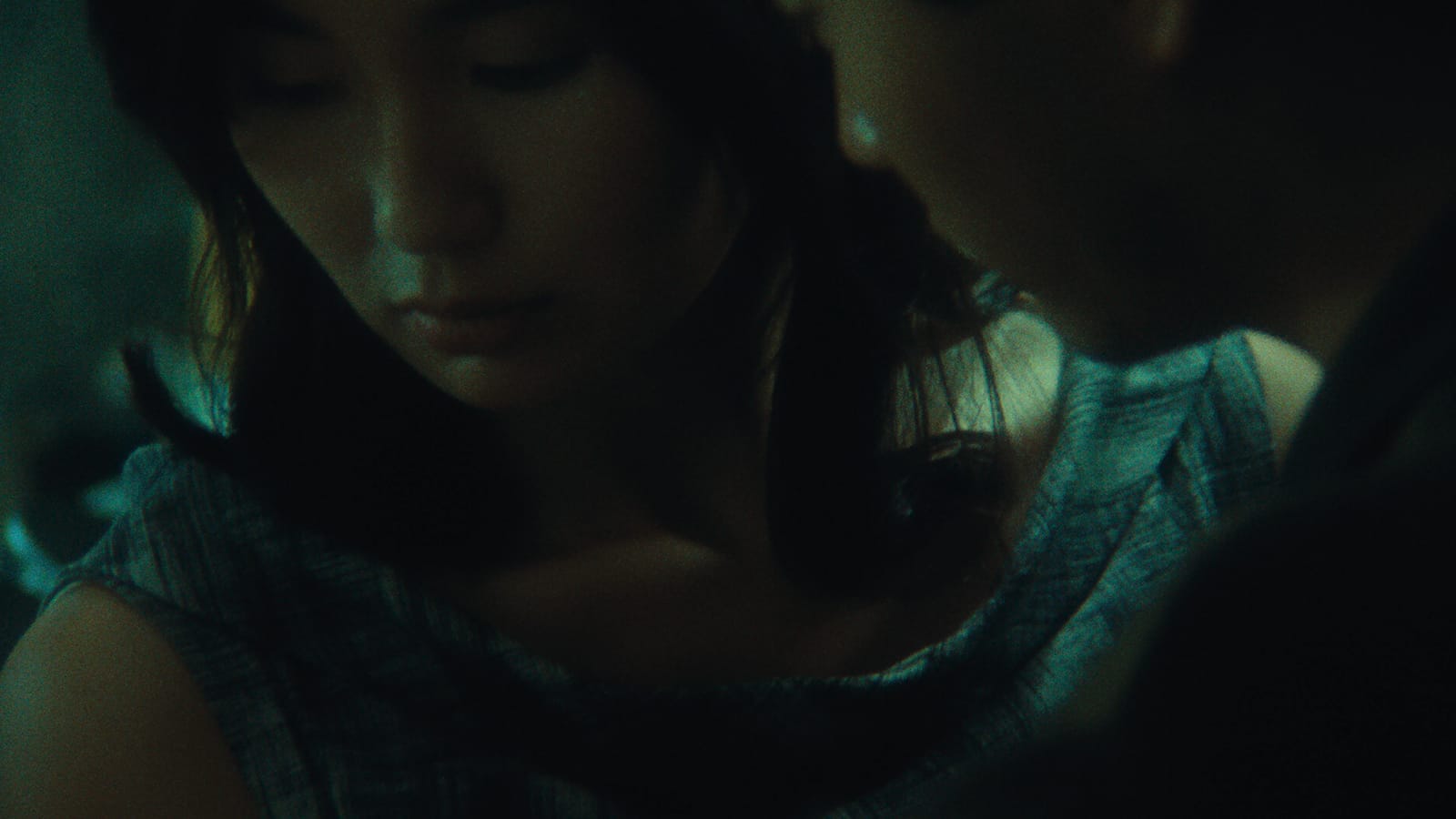 By any standards, the role-playing scene is a simple one, the pair framed facing each other within the confines of a restaurant booth. It reprises, in fact, setttings in As Tears Go By and Days Of Being Wild. The latter makes the stronger parallel, depicting a meeting between Mimi (Carina Lau) and Zeb (Jacky Cheung). Like Chow and Su, their acquaintance is the result of a third-party: the film’s main character, Yuddy (Leslie Cheung), who has since departed their lives. Their relationship is more obviously doomed than Chow and Su’s, but the inevitability of heartbreake is marked on both occasions by the imposition of the restaurant table between them – a physical harbinger, foretelling their ultimate separation.
By any standards, the role-playing scene is a simple one, the pair framed facing each other within the confines of a restaurant booth. It reprises, in fact, setttings in As Tears Go By and Days Of Being Wild. The latter makes the stronger parallel, depicting a meeting between Mimi (Carina Lau) and Zeb (Jacky Cheung). Like Chow and Su, their acquaintance is the result of a third-party: the film’s main character, Yuddy (Leslie Cheung), who has since departed their lives. Their relationship is more obviously doomed than Chow and Su’s, but the inevitability of heartbreake is marked on both occasions by the imposition of the restaurant table between them – a physical harbinger, foretelling their ultimate separation.
From this moment of crossover, the two works diverge. Filmed prior to Chungking Express and Fallen Angels, the most light-hearted of Wong’s films, Days Of Being Wild signals the development of Wong’s early political consciousness. In the adopted Yuddy, ignorant to his mother’s identity, Wong provides an allegory for Hong Kong itself in a film that looks ahead to 1997 and the uncertainty surrounding the city’s handover from British to Chinese rule.
Suitably, time is an unrelenting presence throughout – in the appearance of clocks, in Yuddy’s unspoken anxiety about his mother’s age and potential proximity to death. As Hong Kong mulled over its future, so did Wong. Abstract in its composition, Days of Being Wild shifts erratically between figures who manifest and drop from the narrative without warning, the film enacting a desperate identity crisis of its own, opening fresh avenues where there should be closure. When Zeb climbs in through Yuddy’s apartment window, Mimi enquires as to what type of man displays such behaviour. “Don’t ask so many questions”, Yuddy offers in reply.
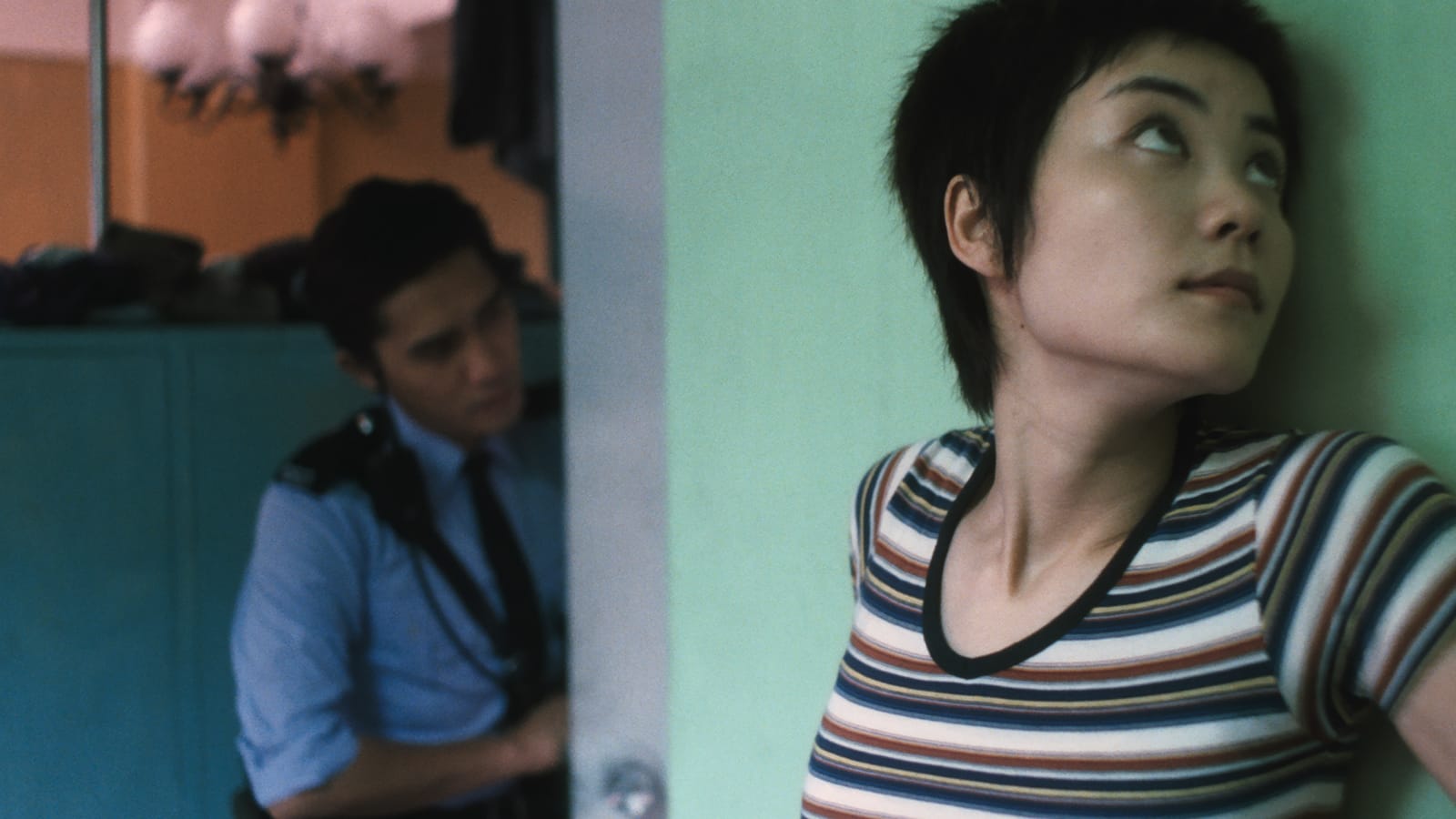 Wong’s political thread recovers itself in his 1997 film, Happy Together. Unique for its Argentine setting, the film opens not in the country proper, but with successive close-up shots of passports belonging to Fai (Tony Leung) and Po (Leslie Chung), the gay couple at the film’s heart, as they are handled and stamped by border officials. An intelligent scene, it is also an ostensibly unnecessary inclusion – few will mistake Buenos Aires for Asia’s “World City”, Happy Together’s primary point of difference more than speaking for itself, underlined yet further by Doyle’s liberal deployment of a rustic monochrome.
Wong’s political thread recovers itself in his 1997 film, Happy Together. Unique for its Argentine setting, the film opens not in the country proper, but with successive close-up shots of passports belonging to Fai (Tony Leung) and Po (Leslie Chung), the gay couple at the film’s heart, as they are handled and stamped by border officials. An intelligent scene, it is also an ostensibly unnecessary inclusion – few will mistake Buenos Aires for Asia’s “World City”, Happy Together’s primary point of difference more than speaking for itself, underlined yet further by Doyle’s liberal deployment of a rustic monochrome.
Nevetheless, inherent in that opening is not only Fai and Po’s destination, but their origin. By 1997, Hong Kong stood on the precipice of its handover – and with it the future of the city’s gay community hung in the balance. Less than signposting a departure from the norm, therefore, Happy Together implicitly looks back, enacting a critical distance from “opposite sides of the world”. As the film develops, Wong’s Argentina reveals itself as a sort of cinematic negative, in which Fai and Po can live out the peaks and pitfalls of their unstable relationship on terms that are purely their own.
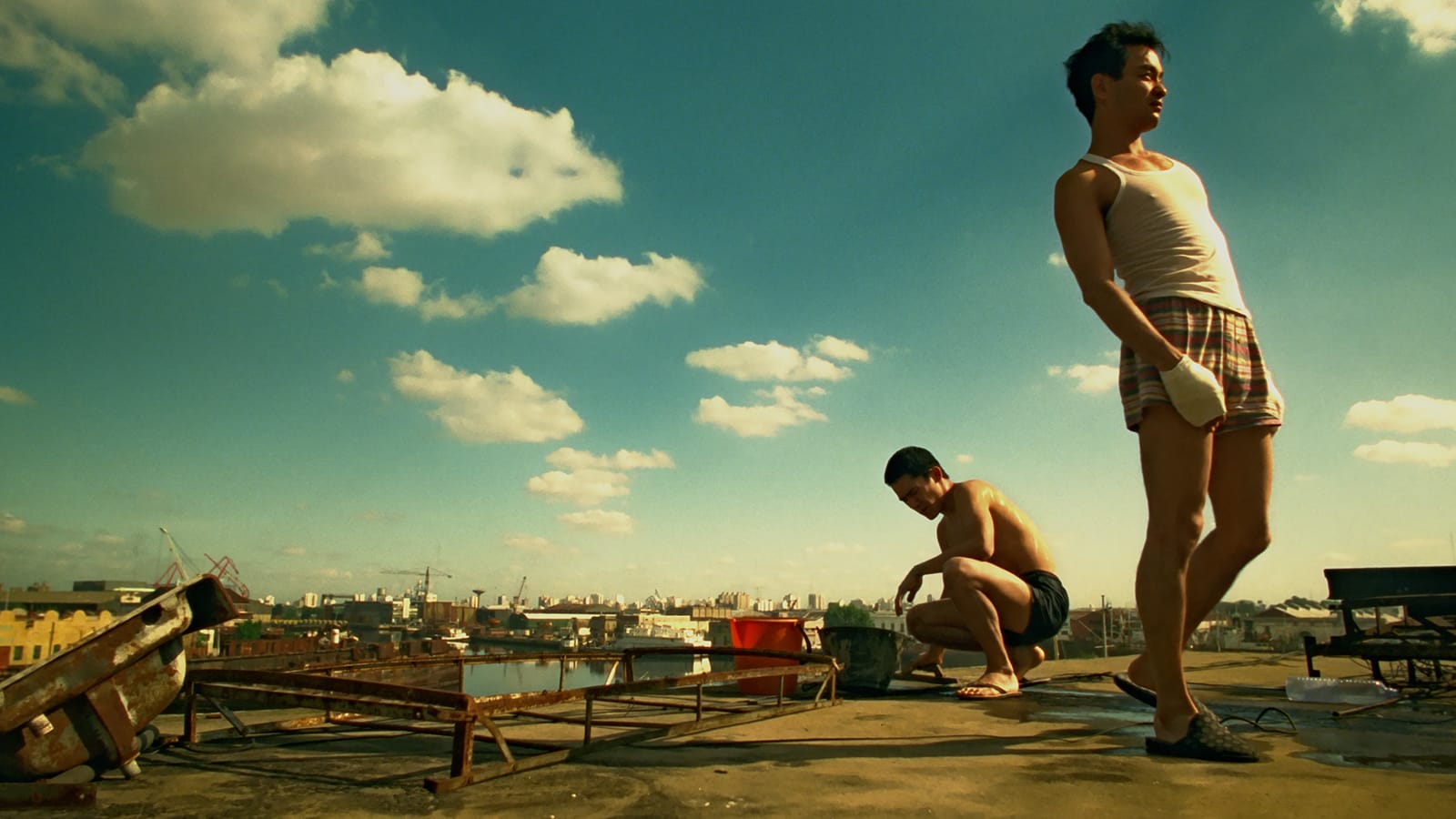 In this context, it would be easy to label Happy Together as a testament to the political power of film. On this point, however, the film is equivocal. Midway through, Fai develops a friendly relationship with a colleague, Chang (Chen Chang), who, blighted with poor eyesight as a child, has developed a keen sense of hearing. “Sometimes I think ears are more important than eyes”, he remarks, before requesting that Fai leave a memento of his voice on a tape recorder, and confirming once again: “I don’t like photographs”. It is a surprising line, one not easy to reconcile with a director whose work makes such dramatic and renowed use of the visual.
In this context, it would be easy to label Happy Together as a testament to the political power of film. On this point, however, the film is equivocal. Midway through, Fai develops a friendly relationship with a colleague, Chang (Chen Chang), who, blighted with poor eyesight as a child, has developed a keen sense of hearing. “Sometimes I think ears are more important than eyes”, he remarks, before requesting that Fai leave a memento of his voice on a tape recorder, and confirming once again: “I don’t like photographs”. It is a surprising line, one not easy to reconcile with a director whose work makes such dramatic and renowed use of the visual.
To do so, it is worth returning to Fallen Angels. There, Wong once again strikes an unusual combination, blending his trademark terse romance with a hitman thriller, set against an absurd subplot starring mute delinquent Ho Chi-moo (Takeshi Kaneshiro). Equipped with a video camera, Ho has made a recording of his father, since deceased. “I watched it over and over”, he explains in voiceover, as scenes are rewound and replayed – re-affirming a persistent link throughout Wong’s work: that the power of film lies in its nostalgic value, its repeatable quality serving as a neat analogy for the function of memory. For Wong, this is a truth less objective than personal, the dissonance between Ho’s and Chang’s experiences stating the case for a subjective apprehension of the universe. As Fai is left to record his message in private, he proceeds not to speak, but to sob, the sound of his tears disguised beneath the bar’s booming music. Visible to the audience, his pain remains invisible to Chang, who is left to wonder if his recorder has broken
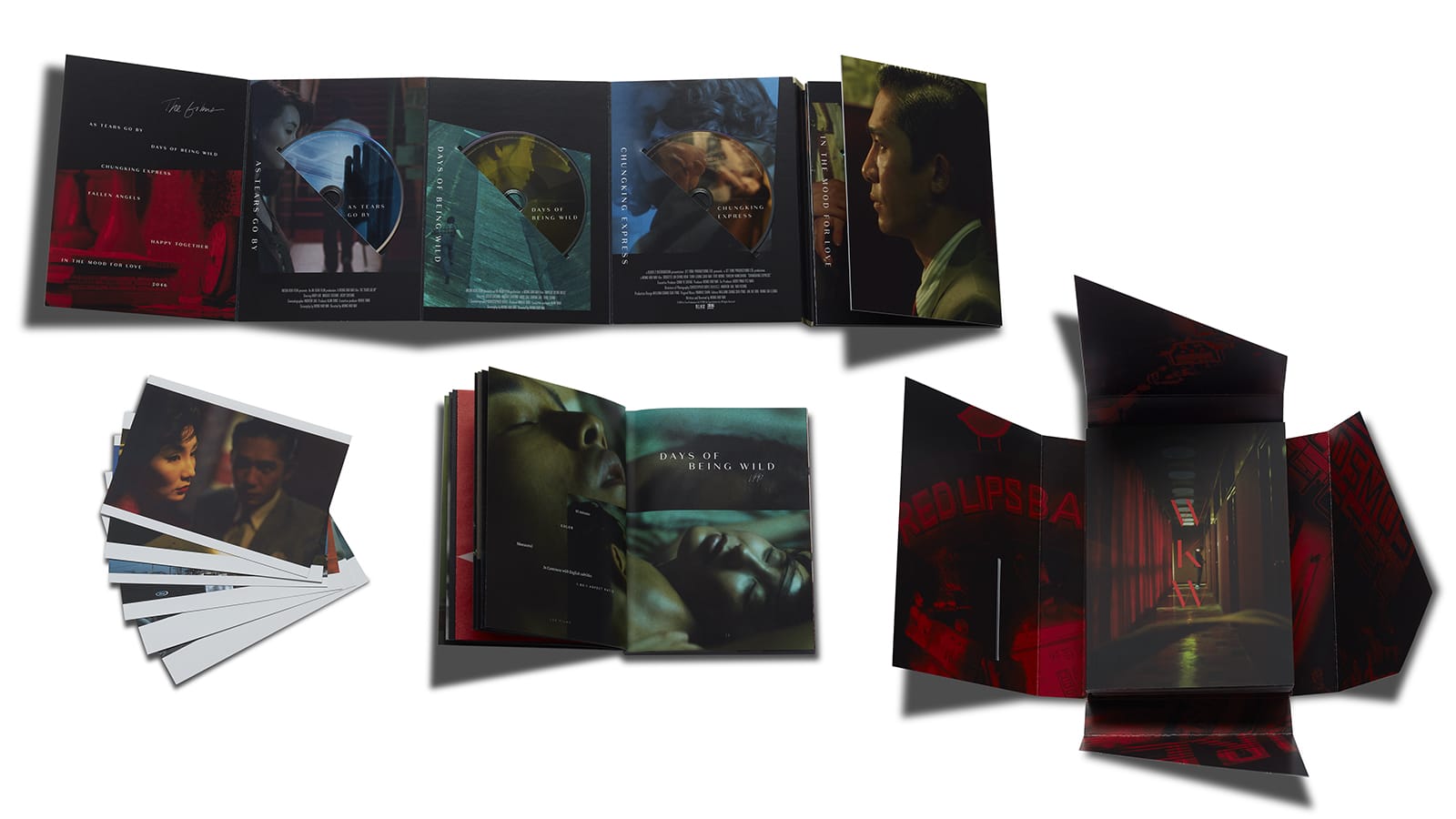 The final film in the collection is 2046. More than 16 years since its release, the film lacks the delicacy of its predecessor, and amounts to a forgettable rehousing of In The Mood For Love’s tragic romance beneath the carapace of science-fiction. Its title, shared with the hotel-room number that inspires Chow’s own fictional story, is a date – in the real world, marking the final year before the culmination of Hong Kong’s “one country, two systems” arrangement.
The final film in the collection is 2046. More than 16 years since its release, the film lacks the delicacy of its predecessor, and amounts to a forgettable rehousing of In The Mood For Love’s tragic romance beneath the carapace of science-fiction. Its title, shared with the hotel-room number that inspires Chow’s own fictional story, is a date – in the real world, marking the final year before the culmination of Hong Kong’s “one country, two systems” arrangement.
Precisely what will replace that arrangement – the subject of recent protest, and of brutal police enforcement – is up for debate. Reports abound of Hong Kong’s “borrowed time”, others cite its “2047 problem”, foretelling the city’s relegation to “appendage”, to be consumed within China’s neighbouring Shenzhen province.
But why “2046”, and not “2047”? Throughout his oeuvre, Wong is drawn to these moments-before – as focal-points for anxiety and reflection, and as a kind of psychological last stand against the inevitable passing of time. More than any of Wong’s films, 2046 exposes the indebtedness of such moments, so global in flavour, not to a universal law, but rather to a particularly Hong Kong-ese social and political climate. For Wong’s characters, it is a truth too close to grasp – such is the inherent logic, and the defining paradox of ‘the world’ of Wong Kar Wai: the thankless search for its own identity.
rating
Share this article
The future of Arts Journalism
You can stop theartsdesk.com closing!
We urgently need financing to survive. Our fundraising drive has thus far raised £49,000 but we need to reach £100,000 or we will be forced to close. Please contribute here: https://gofund.me/c3f6033d
And if you can forward this information to anyone who might assist, we’d be grateful.

Subscribe to theartsdesk.com
Thank you for continuing to read our work on theartsdesk.com. For unlimited access to every article in its entirety, including our archive of more than 15,000 pieces, we're asking for £5 per month or £40 per year. We feel it's a very good deal, and hope you do too.
To take a subscription now simply click here.
And if you're looking for that extra gift for a friend or family member, why not treat them to a theartsdesk.com gift subscription?
more Film
 Downton Abbey: The Grand Finale review - an attemptedly elegiac final chapter haunted by its past
Noel Coward is a welcome visitor to the insular world of the hit series
Downton Abbey: The Grand Finale review - an attemptedly elegiac final chapter haunted by its past
Noel Coward is a welcome visitor to the insular world of the hit series
 Islands review - sunshine noir serves an ace
Sam Riley is the holiday resort tennis pro in over his head
Islands review - sunshine noir serves an ace
Sam Riley is the holiday resort tennis pro in over his head
 theartsdesk Q&A: actor Sam Riley on playing a washed-up loner in the thriller 'Islands'
The actor discusses his love of self-destructive characters and the problem with fame
theartsdesk Q&A: actor Sam Riley on playing a washed-up loner in the thriller 'Islands'
The actor discusses his love of self-destructive characters and the problem with fame
 Honey Don’t! review - film noir in the bright sun
A Coen brother with a blood-simple gumshoe caper
Honey Don’t! review - film noir in the bright sun
A Coen brother with a blood-simple gumshoe caper
 The Courageous review - Ophélia Kolb excels as a single mother on the edge
Jasmin Gordon's directorial debut features strong performances but leaves too much unexplained
The Courageous review - Ophélia Kolb excels as a single mother on the edge
Jasmin Gordon's directorial debut features strong performances but leaves too much unexplained
 Blu-ray: The Graduate
Post #MeToo, can Mike Nichols' second feature still lay claim to Classic Film status?
Blu-ray: The Graduate
Post #MeToo, can Mike Nichols' second feature still lay claim to Classic Film status?
 Little Trouble Girls review - masterful debut breathes new life into a girl's sexual awakening
Urska Dukic's study of a confused Catholic teenager is exquisitely realised
Little Trouble Girls review - masterful debut breathes new life into a girl's sexual awakening
Urska Dukic's study of a confused Catholic teenager is exquisitely realised
 Young Mothers review - the Dardennes explore teenage motherhood in compelling drama
Life after birth: five young mothers in Liège struggle to provide for their babies
Young Mothers review - the Dardennes explore teenage motherhood in compelling drama
Life after birth: five young mothers in Liège struggle to provide for their babies
 Blu-ray: Finis Terrae
Bleak but compelling semi-documentary, filmed on location in Brittany
Blu-ray: Finis Terrae
Bleak but compelling semi-documentary, filmed on location in Brittany
 Oslo Stories Trilogy: Sex review - sexual identity slips, hurts and heals
A quietly visionary series concludes with two chimney sweeps' awkward sexual liberation
Oslo Stories Trilogy: Sex review - sexual identity slips, hurts and heals
A quietly visionary series concludes with two chimney sweeps' awkward sexual liberation
 Sorry, Baby review - the healing power of friendship in the aftermath of sexual assault
Eva Victor writes, directs and stars in their endearing debut feature
Sorry, Baby review - the healing power of friendship in the aftermath of sexual assault
Eva Victor writes, directs and stars in their endearing debut feature
 Blu-ray: Who Wants to Kill Jessie?
Fast-paced and visually inventive Czech comedy
Blu-ray: Who Wants to Kill Jessie?
Fast-paced and visually inventive Czech comedy

Add comment